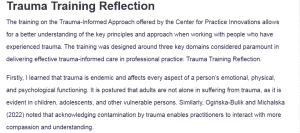Trauma Training Reflection
The training on the Trauma-Informed Approach offered by the Center for Practice Innovations allows for a better understanding of the key principles and approach when working with people who have experienced trauma. The training was designed around three key domains considered paramount in delivering effective trauma-informed care in professional practice: Trauma Training Reflection.
Firstly, I learned that trauma is endemic and affects every aspect of a person’s emotional, physical, and psychological functioning. It is postured that adults are not alone in suffering from trauma, as it is evident in children, adolescents, and other vulnerable persons. Similarly, Ogińska-Bulik and Michalska (2022) noted that acknowledging contamination by trauma enables practitioners to interact with more compassion and understanding.
This important awareness leads to more careful and comprehensive care because the client knows they are accepted, cared for, and valued as a person with a specific experience. This knowledge is also valuable for specialists to ensure the environment is less dangerous for everyone involved.
Secondly, the training elaborated on the six core principles of trauma-informed care: safety, peer support, trustworthiness, empowerment, collaboration, and cultural sensitivity. These principles act as operational guidelines for developing therapeutic facilities and positive patient care environments to reduce re-victimization. Thus, they can be incorporated into everyday operational methods and demonstrate how nurses and other professionals can enable patients to assume more control over their care process and play an active part in receiving correct treatment and becoming active partners again, as well as gaining trust and mutual understanding. This type of care delivery improves the relationship between caregivers and recipients of care by including them in developing and implementing their care plan.
Finally, the training discussed the need to adopt a trauma-informed approach to the organizational culture. Parker and Johnson-Lawrence (2022) highlighted that a culture based on the principles of trauma-informed care calls for deliberate work at multiple system levels toward forming an organizational culture that embodies such principles alongside associated policies and runs free from the culture of toxicity. Ongoing assessment and changes are highly constructive in sustaining the significance and effectiveness of trauma-informed care. These processes allow for proper care of employees and clients through various means and fulfill the changing needs of society.
References
Ogińska-Bulik, N., & Michalska, P. (2022). The role of empathy and cognitive trauma processing in the occurrence of professional posttraumatic growth among women working with victims of violence. International Journal of Occupational Medicine and Environmental Health, 34(2). https://doi.org/10.13075/ijomeh.1896.01945
Parker, S., & Johnson-Lawrence, V. (2022). Addressing trauma-informed principles in public health through training and practice. International Journal of Environmental Research and Public Health, 19(14), 8437. https://doi.org/10.3390/ijerph19148437
ORDER A PLAGIARISM-FREE PAPER HERE
We’ll write everything from scratch
Question
Details
After viewing the training for Trauma Informed Care, please list three things that you learned in the trauma-informed approach training.
https://practiceinnovations.org/resources/trauma-informed-approach

Trauma Training Reflection

